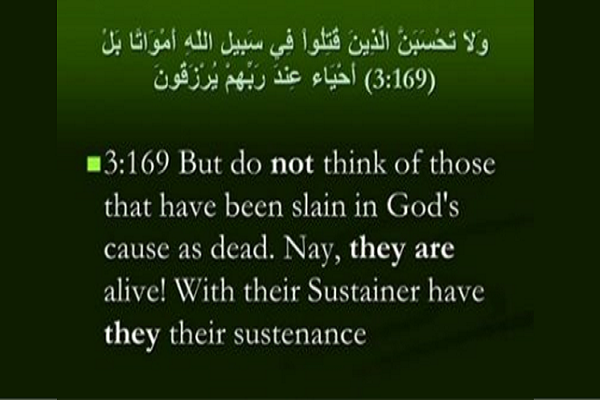AhlulBayt News Agency: The Holy Quran emphasizes that the word death should not be used for martyrs because they live an eternal life.
In some verses of the Quran, those killed on the path of God are lauded. (Verse 154 of Surah Al-Baqarah, Verse 169 of Surah Al Imran, Vrse 74 of Surah An-Nisa, Verse 111 of Surah At-Tawba).
For example in Verse 74 of Surah An-Nisa, God says: “So let those who sell the worldly life for the Everlasting Life fight in the way of Allah, whoever fights in the way of Allah, and is killed or conquers, We shall give him a great wage.”
All in all, there are ten verses in the Quran that are about those killed on the path of God and they refer to issues like martyrs being alive, their Rizq (sustenance), forgiveness of their sins, their happiness, they entering the mercy of God and their salvation.
In Verse 154 of Surah Al-Baqarah, the Quran underlines that the word death is not to be used for martyrs: “Do not say that those killed in the Way of Allah are dead, they are alive, although you are unaware.”
Martyrdom is not a kind of death but it is a form of sublime life understanding which is not possible for people preoccupied with this worldly life.
In fact, a martyr, both during his worldly life and afterward, is moving the path of perfection toward God and is always in the state of everlasting Hayat Tayyiba (pure or happy life).
In another verse, God emphasizes that martyrs enjoy all the features of life: “Do not think of those slain for the cause of God as dead. They are alive with their Lord and receive sustenance from Him.” (Verse 169 of Surah Al Imran)
One of the features of life is having sustenance and martyrs benefit from it in the highest form.
So these verses dispel two wrong perceptions and remind us that martyrs do not die but are alive and have a more sublime form of life. In fact, they enjoy a Hayat Tayyiba and receive a special Rizq from God, the Almighty.
/129
In some verses of the Quran, those killed on the path of God are lauded. (Verse 154 of Surah Al-Baqarah, Verse 169 of Surah Al Imran, Vrse 74 of Surah An-Nisa, Verse 111 of Surah At-Tawba).
For example in Verse 74 of Surah An-Nisa, God says: “So let those who sell the worldly life for the Everlasting Life fight in the way of Allah, whoever fights in the way of Allah, and is killed or conquers, We shall give him a great wage.”
All in all, there are ten verses in the Quran that are about those killed on the path of God and they refer to issues like martyrs being alive, their Rizq (sustenance), forgiveness of their sins, their happiness, they entering the mercy of God and their salvation.
In Verse 154 of Surah Al-Baqarah, the Quran underlines that the word death is not to be used for martyrs: “Do not say that those killed in the Way of Allah are dead, they are alive, although you are unaware.”
Martyrdom is not a kind of death but it is a form of sublime life understanding which is not possible for people preoccupied with this worldly life.
In fact, a martyr, both during his worldly life and afterward, is moving the path of perfection toward God and is always in the state of everlasting Hayat Tayyiba (pure or happy life).
In another verse, God emphasizes that martyrs enjoy all the features of life: “Do not think of those slain for the cause of God as dead. They are alive with their Lord and receive sustenance from Him.” (Verse 169 of Surah Al Imran)
One of the features of life is having sustenance and martyrs benefit from it in the highest form.
So these verses dispel two wrong perceptions and remind us that martyrs do not die but are alive and have a more sublime form of life. In fact, they enjoy a Hayat Tayyiba and receive a special Rizq from God, the Almighty.
/129

